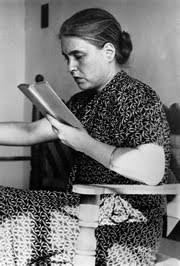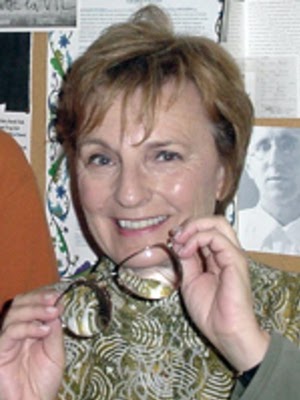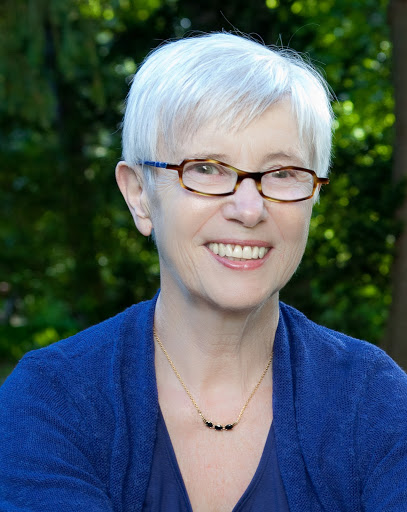German Writers and Race: Anna Seghers (1900-1983)
Monday, July 13, 202012-1:30 pm Eastern Time (US)
Zoom Webinar
You can watch a recording of this and other CGES webinars by clicking the button above.
About the Event
 Born Netty Reiling in Mainz in 1900 into a liberal Jewish family, Seghers studied history, art history, and sinology in Heidelberg and Cologne and completed her doctorate in 1924. She married the Jewish Hungarian exile and fellow student László Radvanyi in 1925 and moved to Berlin, where she quickly won recognition as a writer under the pen name Seghers, allied herself with the international working-class movement, and joined the Communist Party in 1928. In 1933 she was forced to flee to Paris and in 1941 to Mexico City.
Born Netty Reiling in Mainz in 1900 into a liberal Jewish family, Seghers studied history, art history, and sinology in Heidelberg and Cologne and completed her doctorate in 1924. She married the Jewish Hungarian exile and fellow student László Radvanyi in 1925 and moved to Berlin, where she quickly won recognition as a writer under the pen name Seghers, allied herself with the international working-class movement, and joined the Communist Party in 1928. In 1933 she was forced to flee to Paris and in 1941 to Mexico City.
Her best-known work is the antifascist novel The Seventh Cross (completed in 1939) for which she received the Büchner-Prize in 1947. It was first published in the United States in 1942, became a book-of-the-month-club bestseller, and in 1944 was made into a Hollywood film directed by Fred Zimmermann and starring Spencer Tracy. The Seventh Cross was one of the first depictions of Nazi concentration camps. Other notable Seghers works include Transit (1944) which inspired several films, most recently by Christian Petzold in 2019 [trailer].
In 1947, Seghers returned to Berlin. From here she traveled often to France where her son and daughter studied and where she became active in the World Peace Organization. In 1952 she was elected president of the Writers Union of the GDR, which she remained until 1978. During this time she continued to be productive and wrote many of her characteristic stories that depict struggles against racism and oppression in China, Africa, the Caribbean islands, and Latin America. As a consummate writer she received many prizes and honors, the first being the coveted Kleist Preis in 1928, and in 1981, the Honorary Citizenship of her home town of Mainz. Seghers died in Berlin on June 1, 1983.
About the Speakers
 Ute Brandes, Georges Lurcy Professor of German at Amherst College in Massachusetts, studied German literature at Harvard University, where she received her Ph.D. 1982. She has been writing on Anna Seghers since 1992. Her work about the authors’ narratives about the 1960s and 1950s led her back into the time of exile in Paris and Mexico City. Currently Brandes works on Seghers’ Der Kopflohn.
Ute Brandes, Georges Lurcy Professor of German at Amherst College in Massachusetts, studied German literature at Harvard University, where she received her Ph.D. 1982. She has been writing on Anna Seghers since 1992. Her work about the authors’ narratives about the 1960s and 1950s led her back into the time of exile in Paris and Mexico City. Currently Brandes works on Seghers’ Der Kopflohn.
 Helen Fehervary, Professor emerita/Academy Professor of German Studies at Ohio State University, has written extensively on 20th-century German literature and theater. Her work on Seghers includes a monograph, a critical edition, circa 40 scholarly articles, and translations. Since 1998 she has been general editor of the Anna Seghers Werkausgabe, currently co-edited with Carsten Jakobi, Universität Mainz.
Helen Fehervary, Professor emerita/Academy Professor of German Studies at Ohio State University, has written extensively on 20th-century German literature and theater. Her work on Seghers includes a monograph, a critical edition, circa 40 scholarly articles, and translations. Since 1998 she has been general editor of the Anna Seghers Werkausgabe, currently co-edited with Carsten Jakobi, Universität Mainz.
 Christiane Zehl Romero is Professor of German, International Literary and Visual Studies and Goldthwaite Professor of Rhetoric Emerita at Tufts University. Her research interests include the twentieth century, women writers, and film. She is the author of four books and has worked and published extensively on Anna Seghers.
Christiane Zehl Romero is Professor of German, International Literary and Visual Studies and Goldthwaite Professor of Rhetoric Emerita at Tufts University. Her research interests include the twentieth century, women writers, and film. She is the author of four books and has worked and published extensively on Anna Seghers.